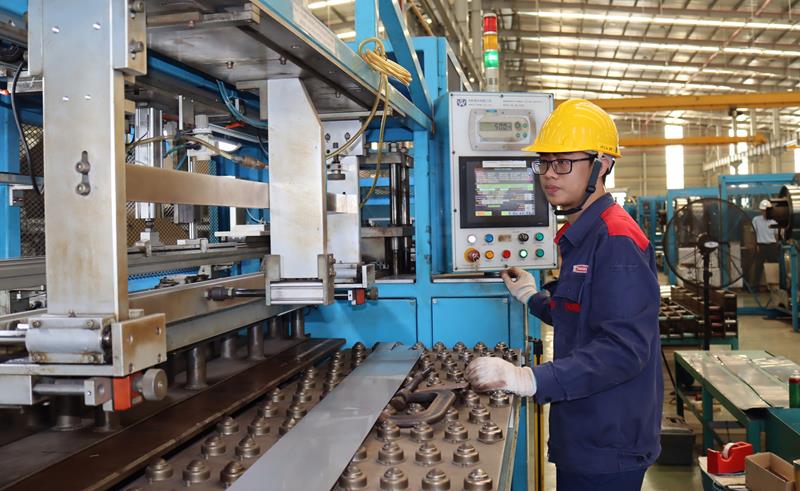(News Portal – Dong Nai) - EPR, or Extended Producer Responsibility, is the obligation of manufacturers regarding the disposal of packaging and products. This is not only a legal requirement but also a green certification that enables businesses to deeply integrate into the global supply chain and meet the growing demands of consumers.
.jpg)
Experts and Businesses Discuss EPR Regulations at the 2024 Green Economy Forum and Exhibition
Mandatory Implementation
EPR is a solution to transition the economy from brown to green. By sorting, collecting, and recycling packaging, businesses can create new products while reducing emissions into the environment.
For recycling responsibilities, businesses can choose between two options: organizing recycling themselves or contributing to the Vietnam Environmental Protection Fund to support recycling. Regarding waste collection and treatment, producers and importers of regulated product groups must financially contribute to supporting waste collection and treatment. Thus, extended producer responsibility is not merely an encouraged activity but a legal mandate. Businesses failing to fulfill these responsibilities could face fines of up to 2 billion VND.
The Environmental Protection Law of 2020 and Government Decree No. 08/2022/ND-CP, dated January 10, 2022, outline the responsibilities of EPR. Accordingly, producers and importers are responsible not only for the products they create but also for the packaging of products after use.
Karin Greve, Commercial Attaché of the Norwegian Embassy in Viet Nam, commented that establishing and enforcing the EPR mechanism is a positive effort by the Vietnamese government. To maximize the effectiveness of this mechanism, it is essential to raise public awareness about waste sorting at the source. For businesses, a symbiotic network must be formed so that waste from production facilities becomes raw material for recycling centers. Recycled products can then become new packaging for production facilities. The government should provide support and incentives to encourage businesses to participate. In the long run, a roadmap to increase the recycling rate of packaging and waste for businesses should be established, with the goal of recycling as much as possible. At the same time, investment in improving the quality of recycled products should be promoted to boost economic efficiency and minimize environmental waste.
Greg Laski, Founder and CEO of TGM Research, shared that successfully implementing the policy of sorting waste at the source could bring about significant economic, social, and environmental changes. TGM Research has conducted multiple studies to contribute to community projects and sustainable development solutions, including waste recycling. He advised managers not to be discouraged if businesses implement EPR slowly or do not achieve the desired results because this is a new regulation, and implementation requires time, technical infrastructure, and technology. The initial focus should be on raising awareness, sharing experiences, and knowledge so that the public and businesses understand the regulations and how to comply effectively.

Production at Thibidi JSC in Long Duc Industrial Park
Many Businesses Have Already Implemented EPR
In reality, even before the EPR regulations come into effect on January 1, 2025, many businesses have already shifted their management models, investing in machinery, technology, and raw materials to reduce emissions and meet the demands of the market and consumers.
Mr. Khuat Quang Hung, Director of Communications and External Relations at Nestlé Vietnam, stated that the circular economy is an inevitable trend as natural resources become increasingly depleted, environmental pollution worsens, and climate change intensifies. Nestlé Vietnam agrees with Vietnam's EPR policy. Nestlé has transitioned to a circular economy model, from product design to transforming waste into valuable raw materials to protect the environment and natural resources. In addition, Nestlé strives to reduce emissions throughout the entire value chain, from sourcing raw materials and production to product distribution and post-use packaging.
Mr. Le Anh, Director of Sustainable Development at Duy Tân Recycled Plastics JSC, shared that the company began recycling plastics in 2020. In its early years, the company processed 10 tons of raw materials per day, with products mainly sold in foreign markets due to higher costs compared to virgin plastics. However, with the demands of global trade and especially the upcoming EPR regulations, the demand for recycled plastics has increased, allowing the company to process up to 180 tons of raw materials per day. According to Mr. Le Anh, the challenge for recycling businesses today is the low rate of waste sorting at the source, leading to incomplete collection of recyclable materials. This results in a shortage of raw materials for recycling businesses, with only about 70% of collected plastic waste being recyclable.
Agreeing with this viewpoint, Mrs. Giang Nguyen, Managing Director of Tetra Pak Viet Nam (Ho Chi Minh City), noted that many recyclable waste materials are mixed with waste destined for disposal, resulting in both a waste of resources and higher treatment costs. The most effective solution to promote the recycling of packaging and discarded products is to enhance waste sorting and collection at the source. In the current context, the EPR policy is essential as a tool to raise awareness among the public and businesses regarding waste management.